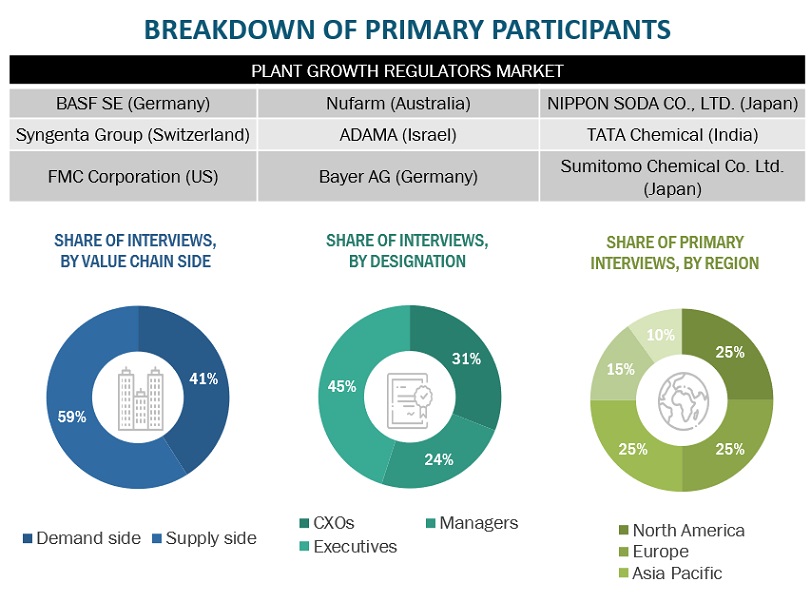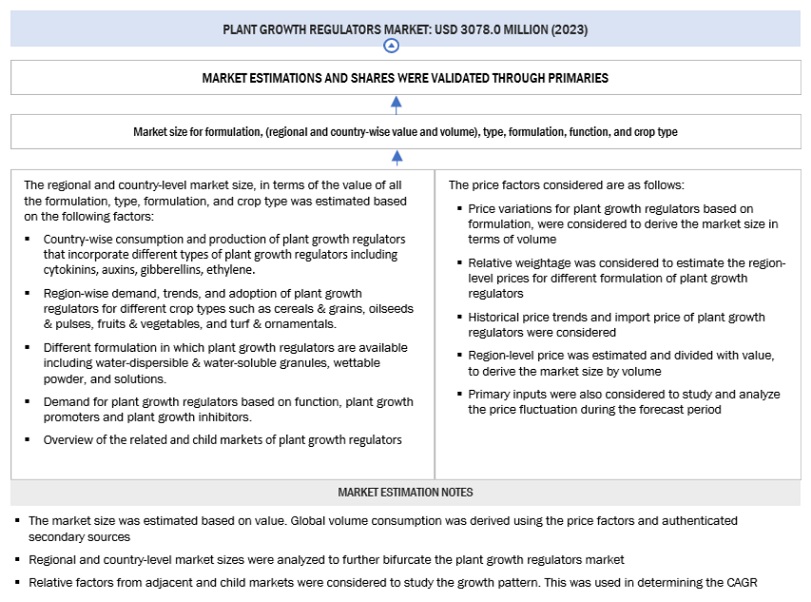The study involved four major activities in estimating the current size of the plant growth regulators market. Exhaustive secondary research was done to collect information on the market, peer, and parent markets. The next step was to validate these findings, assumptions, and sizing with industry experts across the value chain through primary research. Both top-down and bottom-up approaches were employed to estimate the complete market size. After that, market breakdown and data triangulation were used to estimate the market size of segments and subsegments.
Secondary Research
This research study involved the extensive use of secondary sources—directories and databases such as Bloomberg Businessweek and Factiva—to identify and collect information useful for a technical, market-oriented, and commercial study of the plant growth regulators market.
In the secondary research process, various sources such as annual reports, press releases & investor presentations of companies, white papers, certified publications, articles from recognized authors, gold & silver standard websites, directories, and databases were referred to identify and collect information. This research study involved the extensive use of secondary sources—directories and databases such as Bloomberg Businessweek and Factiva—to identify and collect information useful for a technical, market-oriented, and commercial study of the plant growth regulators market.
Secondary research was mainly used to obtain key information about the industry’s supply chain, the total pool of key players, and market classification and segmentation as per the industry trends to the bottom-most level, regional markets, and key developments from both market- and technology-oriented perspectives.
Primary Research
Extensive primary research was conducted after obtaining information regarding the plant growth regulators market scenario through secondary research. Several primary interviews were conducted with market experts from both the demand and supply sides across major countries of North America, Europe, Asia Pacific, the Middle East & Africa, and South America. Primary data was collected through questionnaires, emails, and telephonic interviews. The primary sources from the supply side included various industry experts, such as Chief X Officers (CXOs), Vice Presidents (VPs), Directors from business development, marketing, research, and development teams, and related key executives from distributors and key opinion leaders. Primary interviews were conducted to gather insights such as market statistics, data on revenue collected from the products and services, market breakdowns, market size estimations, market forecasting, and data triangulation. Primary research also helped in understanding the various trends related to crop type, type, formulation, function, and region.

To know about the assumptions considered for the study, download the pdf brochure
Market Size Estimation
Both the top-down and bottom-up approaches were used to estimate and validate the total size of the Plant Growth Regulators Market. These approaches were also used extensively to estimate the size of various dependent submarkets. The research methodology used to estimate the market size includes the following:
-
Key players were identified through extensive secondary research.
-
Primary and secondary research determined the industry’s value chain and market size.
-
All percentage share splits and breakdowns were determined using secondary sources and verified through primary sources.
-
All the possible parameters that affect the markets covered in this research study were accounted for, viewed in extensive detail, verified through primary research, and analyzed to obtain the final quantitative and qualitative data.
-
The following figure provides an illustrative representation of the complete market size estimation process implemented in this research study for an overall estimation of the plant growth regulators market in a consolidated format.
The following sections (bottom-up & top-down) depict the overall market size estimation process employed for the purpose of this study.
Global Plant Growth Regulators Market: Bottom-Up Approach

To know about the assumptions considered for the study, Request for Free Sample Report
Global Plant Growth Regulators Market: Top-Down Approach

Data Triangulation
After arriving at the overall market size from the estimation process explained above, the total market was split into several segments and subsegments. Data triangulation and market breakdown procedures were employed, wherever applicable, to estimate the overall plant growth regulators market and arrive at the exact statistics for all segments and subsegments. The data was triangulated by studying various factors and trends from the demand and supply sides. The market size was also validated using both the top-down and bottom-up approaches.
Market Definition
According to the Ministry of Agriculture, Food and Rural Affairs, Ontario:
Plant Growth Regulators are chemicals used to modify plant growth, such as increasing branching, suppressing shoot growth, increasing return bloom, removing excess fruit, or altering fruit maturity. Numerous factors affect plant growth regulator performance, including how well the plant absorbs the chemical, tree vigor and age, dose, timing, cultivar, and weather conditions before, during, and after application. Plant growth regulators can be grouped into six classes: compounds related to auxins, gibberellins, gibberellin biosynthesis inhibitors, cytokinins, abscisic acid, and compounds affecting the ethylene status.
Key Stakeholders
-
Supply-Side: Plant Growth Regulators Producers, Suppliers, Distributors, Importers, and Exporters
-
Demand Side: Large-Scale Crop Farmers, Large-Scale Orchids, and Researchers
-
Agricultural Co-operative Societies
-
Government, Research Organizations, and Institutions
-
Technology Providers to Plant Growth Regulator Manufacturing Companies.
-
Regulatory Bodies
-
World Health Organization (WHO)
-
European Crop Protection Agency (ECPA)
-
Pesticides Manufacturers and Formulators Association (PMFAI)
-
China Crop Protection Industry Association (CCPIA)
-
Food and Agriculture Organization (FAO)
-
US Department of Agriculture (USDA)
-
Institute of Food and Agricultural Sciences (IFAS)
-
US Environmental Protection Agency (US EPA)
-
Organization for Economic Co-operation and Development (OECD)
-
Federal Office Of Consumer Protection and Food Safety
-
European Food Safety Authority
-
Ministry of Agriculture & Farmers Welfare
-
Department Of Agriculture, Cooperation & Farmers Welfare
-
Directorate Of Plant Protection, Quarantine & Storage
-
Commercial Research & Development (R&D) Institutions and Financial Institutions
Report Objectives
Market Intelligence
-
To determine and project the size of the plant growth regulators market with respect to the function, type, formulation, crop type, and region, over five years, ranging from 2024 to 2029.
-
To identify the attractive opportunities in the market by determining the largest and fastest-growing segments across the key regions
-
To analyze the demand-side factors based on the following:
-
Impact of macro-and micro-economic factors on the market
-
Shifts in demand patterns across different subsegments and regions.
Competitive Intelligence
-
Identifying and profiling the key players in the plant growth regulators market
-
Providing a comparative analysis of market leaders based on the following:
-
Product offerings
-
Business strategies
-
Strengths and weaknesses
-
Key financials
-
Understanding the competitive landscape and identifying the major growth strategies players across the country adopt.
-
Providing insights on key product innovations and investments in the plant growth regulators market.
Available Customizations:
With the given market data, MarketsandMarkets offers customizations according to company-specific scientific needs.
The following customization options are available for the report:
Product Analysis
-
Product Matrix, which gives a detailed comparison of the product portfolio of each company.
Geographic Analysis
With the given market data, MarketsandMarkets offers customizations according to company-specific scientific needs.
-
Further breakdown of the Rest of Europe into Spain, the Czech Republic, the Netherlands, Belgium, Hungary, Romania, Ireland, and other EU & non-EU countries.
-
Further breakdown of the Rest of Asia Pacific into South Korea, Thailand, Kazakhstan, Vietnam, Indonesia, and Myanmar.
-
Further breakdown of the Rest of South America into Chile, Colombia, Peru, Uruguay, and other South American countries.
Company Information
-
Detailed analyses and profiling of additional market players (up to five)



B.
Oct, 2019
We need information on unique PGR product not being used in India and manufactured internationally. Is this information covered in the report?.